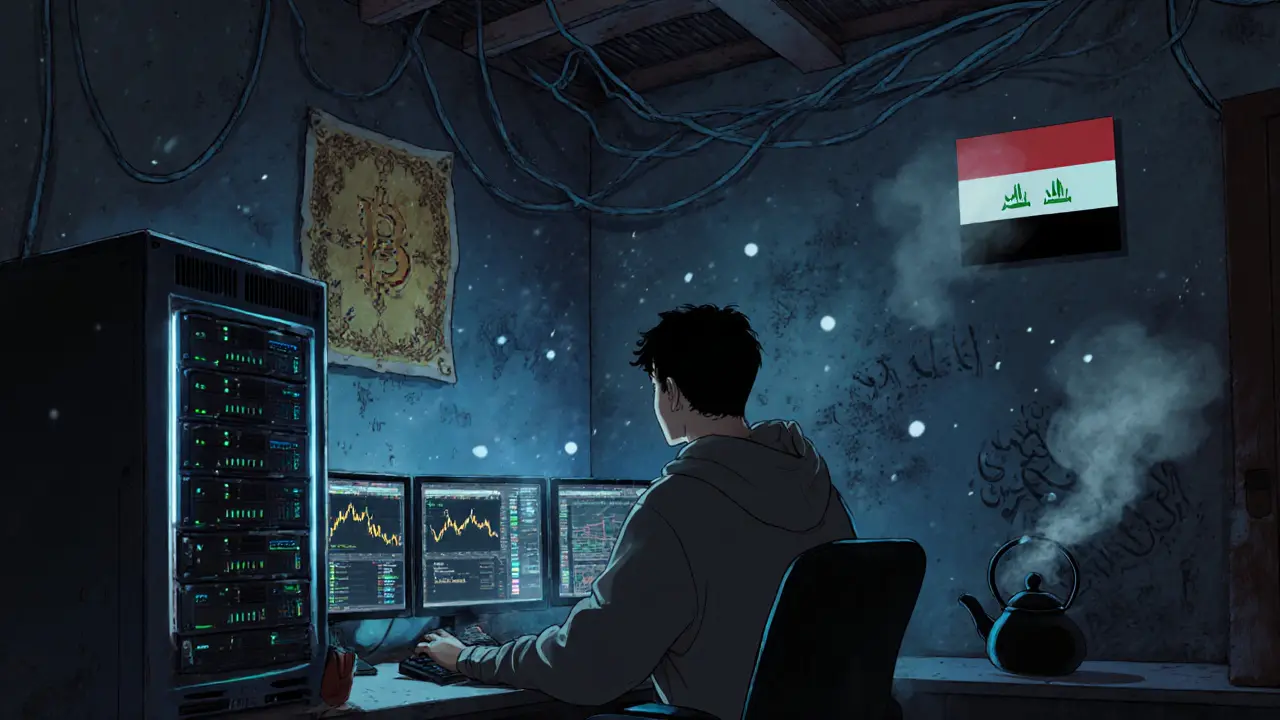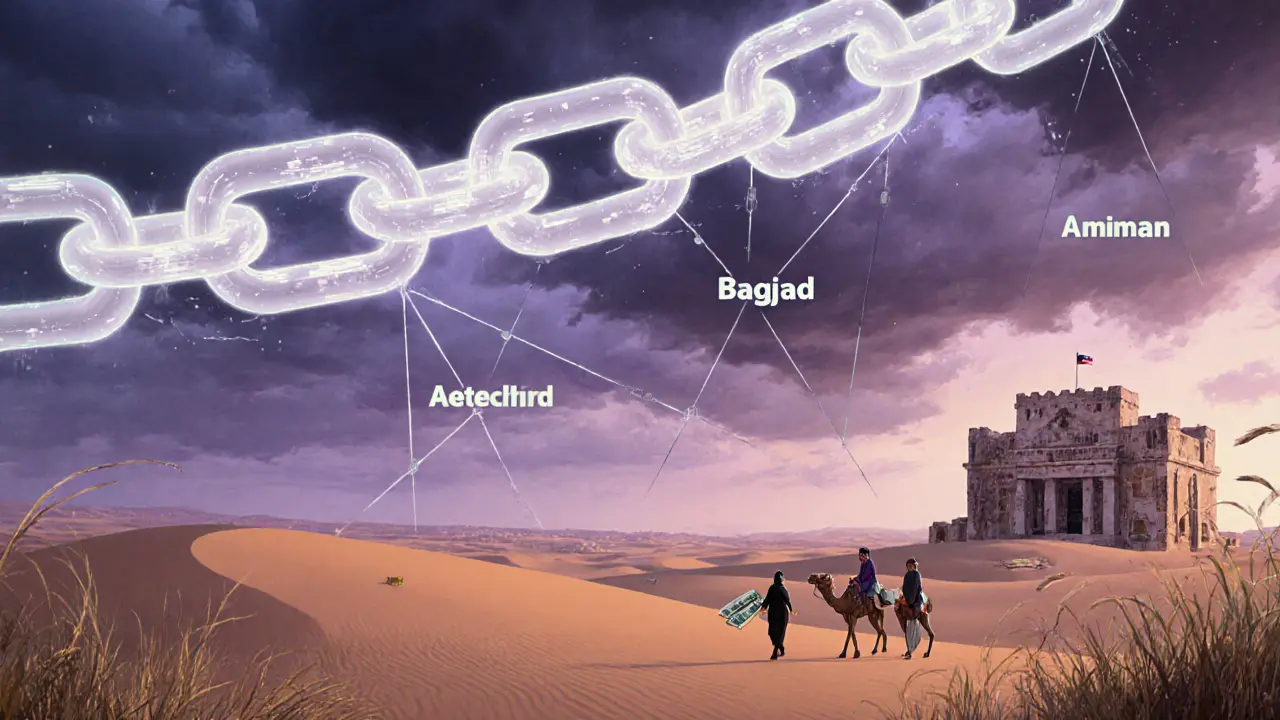Iraq Crypto Mining Cost Calculator
Mining Calculator
Results
Back in 2017, Iraq made a bold move - it banned cryptocurrency mining and trading outright. No exceptions. No gray areas. The Central Bank of Iraq (CBI) declared digital currencies illegal, calling them a threat to the nation’s financial stability. Five years later, the ban is still in place. And despite the global surge in crypto adoption, Iraq hasn’t budged. Not even a little.
Why Did Iraq Ban Crypto in the First Place?
The Central Bank of Iraq didn’t wake up one day and decide to outlaw Bitcoin out of nowhere. The decision came after months of internal warnings. Cryptocurrencies were slipping through the cracks of Iraq’s already fragile banking system. No oversight. No taxes. No accountability. Transactions happened in the dark, outside any legal framework. The bank’s main concerns? Money laundering, fraud, and the risk of destabilizing the national currency. Iraq’s economy was still recovering from decades of conflict. The last thing officials wanted was a flood of untraceable digital cash inflating prices, fueling speculation, or being used to fund illegal activity. They also feared that ordinary citizens, desperate for better financial tools, would lose everything to volatile crypto schemes. In 2018, the Kurdistan Regional Government added weight to the ban when its Supreme Fatwa Committee ruled that OneCoin - a notorious crypto scam - violated Islamic law. That move wasn’t just about finance; it was a religious and cultural signal. The message was clear: crypto wasn’t just risky, it was morally questionable in the eyes of many.How the Ban Works in Practice
The law is simple: no buying, selling, mining, or holding cryptocurrencies through any Iraqi financial institution. Banks can’t process crypto-related payments. Payment processors can’t support digital wallets. Even using foreign crypto cards to make purchases inside Iraq is forbidden. The CBI also banned electronic wallets and digital cards for speculative trading. That means if you try to use a crypto debit card to pay for groceries in Baghdad, the transaction will be blocked. If a bank detects any link between an account and crypto activity - even indirect - the account can be frozen. But here’s the catch: the ban only applies to formal institutions. It doesn’t stop people. It doesn’t stop miners. It doesn’t stop traders. It just makes it dangerous.The Underground Crypto Scene in Iraq
Despite the ban, crypto is alive in Iraq - just not where the government can see it. In Baghdad, people meet in quiet cafes after dark. They whisper about Bitcoin prices. They swap wallet addresses on encrypted apps. Some trade using cash in parking lots. Others run Facebook pages like Ahmed Crypto, a 33-year-old who holds $10,000 in digital assets and manages his portfolio through a pseudonym. He used to have an office. Now he works from home, terrified of being raided. Miners run rigs in basements and back rooms, using cheap electricity from unofficial sources. Some say they’re paying off local officials to look the other way. Others just hope they won’t get caught. There have been arrests - at least two confirmed by underground sources. But legal expert Hayan Al-Khayyat says he’s never seen a formal trial for crypto trading. No one’s been sentenced. No court records exist. That suggests the ban is enforced more through fear than law.
Why the Ban Isn’t Working
Governments think they can shut down crypto by making it illegal. But crypto doesn’t care about borders or bank licenses. It runs on networks, not buildings. In Iraq, the ban has created a black market. People who need to send money abroad - say, a worker in Jordan sending cash home to family in Basra - can’t use traditional remittance services because of slow processing and high fees. So they turn to crypto. They buy Bitcoin in Amman, send it over the border, and their family cashes out in Baghdad through a middleman. It’s faster. Cheaper. And completely illegal. The result? Billions in untracked transactions flow through Iraq every year. The government loses tax revenue. Financial regulators lose control. And ordinary people? They’re stuck in a system that doesn’t serve them. Ashur Al-Nuaimi, another Iraqi crypto user, puts it bluntly: "The Central Bank doesn’t understand blockchain. They’re scared of what they don’t know. So they ban it. But banning doesn’t erase technology. It just pushes it underground."How Iraq Compares to Other Countries
Iraq isn’t alone. As of 2025, only about ten countries have full bans on cryptocurrency. China shut down mining in 2021. Egypt banned it over religious concerns. Bangladesh criminalized possession. Russia restricts it but doesn’t fully ban it. But Iraq’s ban stands out because it’s one of the few in a developing country with a large youth population and weak banking infrastructure. In places like Nigeria or Kenya, crypto filled a void left by banks. In Iraq, the ban created a void - and people are jumping into it anyway. Even Bolivia, which banned crypto in 2014, reversed its decision in 2024 to allow regulated financial institutions to process digital assets. Iraq hasn’t even considered a review.







Brian Gillespie
November 13, 2025 AT 10:00People are just trying to survive.
Edward Phuakwatana
November 13, 2025 AT 11:43Man, this is wild. Iraq’s basically playing Jenga with its economy-pulling out the crypto block and hoping the whole tower doesn’t collapse. 🤯 But here’s the kicker: tech doesn’t care about borders. It’s like banning water because someone drowned. The underground market? That’s not a loophole-it’s a feedback loop of necessity. People aren’t rebels, they’re engineers building a parallel financial OS. And guess what? It’s faster, cheaper, and way more resilient than the Central Bank’s dusty ledger. The real crime? Not mining Bitcoin. Ignoring blockchain’s potential to fix the very systems that failed them. 🌍⚡
Suhail Kashmiri
November 13, 2025 AT 21:13This is just haram nonsense. Islam says no gambling, no uncertainty-crypto is pure maysir. And now these Americans act like it’s some kind of freedom? Nah. It’s sin with a Wi-Fi signal. If you want to send money home, use hawala. At least that’s got integrity. Stop glorifying digital haram.
Kristin LeGard
November 15, 2025 AT 05:44Oh wow, so now we’re romanticizing criminals? People are breaking the law and you’re calling them ‘survivors’? That’s not resilience-that’s recklessness. And let’s not pretend the U.S. is some moral beacon when we’re exporting this chaos. Iraq’s got a sovereign right to protect its currency, unlike some countries that think printing money is a policy. 🇮🇶💪
Arthur Coddington
November 16, 2025 AT 08:53I just can’t. I really can’t. This whole thing feels like someone wrote a dystopian novel and then said ‘wait, what if we made it real?’ The government bans it, people do it anyway, and now we’re all supposed to be like ‘oh how tragic, the little miners in the basement’? Bro. It’s not tragic. It’s just… dumb. Like, why not ban oxygen too? People might use it to breathe illegally.
Phil Bradley
November 17, 2025 AT 02:54Let’s be real-this isn’t about crypto. It’s about control. The CBI doesn’t want people to have financial autonomy. They want to be the gatekeepers. But guess what? You can’t control what you can’t see. And now, instead of a regulated, taxed, transparent system, you’ve got shadow networks, bribes, and scared guys trading in parking lots. That’s not stability. That’s a powder keg with a Wi-Fi password. The real threat isn’t Bitcoin-it’s fear.
Stephanie Platis
November 18, 2025 AT 22:14Let me be perfectly clear: the Central Bank of Iraq did not ‘ban’ crypto-it outlawed it. There is a difference. ‘Ban’ implies a temporary measure. ‘Outlaw’ implies moral and legal condemnation. And in this case, the law is unambiguous: possession, mining, and trading are criminal acts. The fact that enforcement is inconsistent does not negate the law’s validity. Moreover, the reference to ‘Islamic law’ is not merely symbolic-it is foundational. To call this ‘fear’ is to misunderstand the cultural and theological gravity of the situation.
Michelle Elizabeth
November 18, 2025 AT 23:53It’s funny how the West romanticizes underground economies. We love the ‘rebel hacker’ narrative-until someone’s grandma gets scammed out of her life savings by a ‘crypto guru’ on Telegram. Then it’s ‘oh no, the system failed!’ But no-*you* failed. You didn’t build infrastructure. You didn’t educate. You just left a vacuum. And now you’re surprised people filled it with chaos?
Joy Whitenburg
November 19, 2025 AT 10:10ok but like… imagine being in iraq and your family needs money but the bank takes 3 weeks and charges 20% to send it? so you just… send btc? it’s 5 mins and costs $1. who’s the villain here? the person trying to feed their kids or the bank that’s too slow to care? 🤷♀️ also i hope the miners are using solar. that’d be so cool.
Kylie Stavinoha
November 19, 2025 AT 11:14This situation is a microcosm of the global tension between sovereignty and decentralization. Iraq’s stance reflects a deeply rooted cultural and institutional resistance to financial abstraction-a resistance shared by many post-conflict societies. Yet, the persistence of crypto usage reveals a fundamental truth: when formal institutions fail, informal networks emerge as adaptive systems. The irony lies not in the ban’s existence, but in its futility. Technology does not negotiate; it evolves. The CBI’s silence is not strength-it is stagnation. Perhaps the path forward isn’t enforcement, but translation: translating blockchain’s principles into culturally intelligible, regulated frameworks. Not to surrender, but to integrate.
Diana Dodu
November 20, 2025 AT 02:36Look, I get it-people are desperate. But let’s not pretend this is some noble resistance. This isn’t civil rights-it’s anarchy with a wallet. And while you’re all over here calling it ‘innovation,’ the real victims are the people who get scammed by OneCoin 2.0 or lose everything to a rug pull. The government’s job isn’t to be trendy-it’s to protect its people. And right now, crypto is a predator in a land full of prey.
Raymond Day
November 21, 2025 AT 22:28So let me get this straight-you’re telling me that in a country with rolling blackouts, people are running 10kW rigs in their basements to mine Bitcoin? And you think that’s *cool*? 😂 Bro. That’s not crypto. That’s a power grid hostage situation. And now you want to talk about ‘regulation’? First fix the lights. Then talk about blockchains. Until then, this is just digital pyromania.
Adrian Bailey
November 22, 2025 AT 01:55man i just read this whole thing and i’m like… wow. i mean, i get why the bank is scared. power outages? no oversight? yeah that’s a nightmare. but also… people are using crypto because the system is broken, not because they’re trying to be hackers. i’ve got a cousin in baghdad who uses it to send money to his sister-no fees, no waiting. and yeah, it’s sketchy, but it’s the only thing that works. maybe instead of arresting people, the government could just… make a better system? like, i dunno, partner with blockchain devs? create a state-backed stablecoin? i’m just sayin’. also i think the miners are probably using solar now. i read a reddit post about it. idk if it’s true but i hope so 😅
Rachel Everson
November 23, 2025 AT 18:42you’re not wrong. people aren’t criminals-they’re problem solvers. the system failed them, so they built their own. that’s not rebellion, that’s resilience. and honestly? if the government spent half as much energy on building a real financial alternative as they do on threatening people, we’d be in a totally different place. maybe it’s time to stop seeing crypto as the enemy and start seeing it as a symptom.
Arthur Crone
November 24, 2025 AT 23:06Everyone’s acting like this is a moral dilemma. It’s not. It’s incompetence. The Central Bank doesn’t understand tech. They don’t want to. So they ban it. That’s not policy. That’s surrender wrapped in a legal document. The underground market? It’s not a loophole-it’s a funeral pyre for public trust. And you? You’re just watching it burn and calling it ‘interesting.’
Michael Heitzer
November 25, 2025 AT 11:24Let me tell you something: this isn’t about Bitcoin. It’s about agency. In a country where the state can’t guarantee basic services, crypto becomes the only tool that gives people control. It’s not about speculation-it’s about survival. And guess what? The world is moving toward decentralized systems. Iraq is clinging to a 20th-century model while the future is already mining in basements. The question isn’t whether the ban will fall-it’s whether the government will be ready when it does. The future doesn’t wait for fear.
Rebecca Saffle
November 25, 2025 AT 15:10Oh, so now it’s ‘survivors’? What about the families who lost everything to fake coins? What about the kids whose parents got arrested for having a wallet? This isn’t some romantic rebellion-it’s a disaster with a hashtag. And you’re all just here to cheerlead the chaos like it’s a TikTok trend. Grow up. This isn’t freedom. It’s financial PTSD.
Wayne Dave Arceo
November 26, 2025 AT 13:00Let’s be clear: the U.S. has no moral authority to lecture Iraq on financial sovereignty. We’ve weaponized the dollar for decades. We’ve sanctioned entire nations. Now you want to pretend crypto is a human right? No. It’s a tool-and like any tool, it must be governed. Iraq is not ‘falling behind.’ It’s protecting its people from predatory global finance. The real threat isn’t the ban-it’s the arrogance of those who think their tech is superior to their culture.
Joanne Lee
November 28, 2025 AT 09:50I find myself wondering: if the Central Bank of Iraq had engaged with blockchain developers early on, could this have been avoided? Could regulated mining have stabilized the grid? Could a state-backed digital currency have restored trust? The absence of dialogue suggests not a policy of security, but a policy of ignorance. Is it possible that the greatest threat to Iraq’s financial integrity is not cryptocurrency-but the refusal to understand it?
Laura Hall
November 29, 2025 AT 00:41hey everyone-i just wanna say i’m really sorry this is happening to iraqi people. no one should have to trade crypto in parking lots because their bank won’t help them. we’re all just trying to make things better, right? maybe instead of yelling at each other, we could actually help? like, i know some devs who’d love to build a simple, offline crypto app for iraq-no wallets, just qr codes and cash pick-up points. if anyone wants to collaborate, dm me. we can do this. ❤️
Edward Phuakwatana
November 29, 2025 AT 18:24That’s the spirit. Imagine if the CBI partnered with local devs instead of chasing them. A state-backed, energy-efficient, offline-capable crypto mesh network-using solar-powered nodes in mosques and community centers. Imagine a currency that works even during blackouts. That’s not fantasy. That’s Iraq’s opportunity. The ban isn’t the enemy. Complacency is.